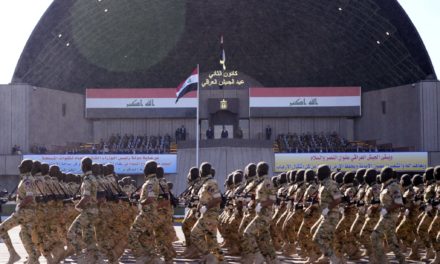(Ilısu dam in the south-east Anatolia region of Turkey)
One of the critical problems Iraq is facing today is the water crisis which is caused by global warming, climate change, and the decreasing average of rainfall. However, what made this crisis more severe in Iraq is Turkey’s construction of dams on the Tigris and Euphrates Rivers without taking into consideration the water rights of Iraq and Syria.
By the end of constructing all the dams projected in the Southeast Anatolian Project (GAP), a mega project consisting of 22 dams and 19 hydraulic power plants, Turkey will have gained control over most of the Tigris and Euphrates water, depriving Iraq of 80% of the water it was receiving before the construction of these dams. This will lead to a draught of the Tigris and Euphrates Rivers, as well as changes in the environment, and an increase in temperature of which will cause direct and indirect humanitarian, social, and economic problems for the Iraqi people.
Turkey sticks by the principle of absolute sovereignty over its natural resources, which is one of the fundamental principles of classical international law. Just like how countries stick by their sovereignty over their gas and oil resources, Turkey claims the same full controlling rights over all the rivers starting from Turkey, including the Tigris and Euphrates.
Iraq, on the other hand, strives to create a system that preserves the water security for the whole region, insisting on reaching agreements about sharing water resources between the countries of the region to save the interests of all people involved.

This is why for instance Iraq signed the ‘Friendship and Neighborly Relations Treaty’ with Turkey in 1946, which according to article 1 of the protocol of this treaty, Turkey agrees to inform Iraq about the projects it plans to implement on the Tigris and Euphrates and their branches, with the goal of coordination in order to secure the interests of both parties involved.
Furthermore, in 1964 Iraq signed an agreement to supply Kuwait with fresh water. According to this agreement, Iraq commits to supply Kuwait with 350 million gallons in the first phase, and 700 million gallons of fresh water per day in the second phase.
In 2008, Iraq and Iran agreed to resolve all the disputes between the two countries based on the treaties signed in 1975, including the treaty to allocate the water between Iraq and Iran based on the decision of a commission of experts from both countries which is tasked with determining the share of each country from the international rivers.
This shows that Iraq, as mentioned above, is committed to achieving water security for the whole region. However, unlike the internal rivers which start and end on Turkish territory and upon which it has absolute sovereignty, the Tigris and Euphrates are international rivers, and the utilization of their water is governed by international law.
Turkey’s actions that deprive Iraq of its legitimate water share are a clear breach of international law. Based on this law, no country has without a treaty the right to change the flow of rivers or utilize their water in a way that harms the interests of other countries. This issue has been emphasized repeatedly in international resolutions issued by the United Nations General Assembly and the Stockholm Declaration of 1972 which points towards the sovereign right to utilize water resources in a way that does not harm other countries. Therefore, this issue has become an international norm, which is binding based on international law.
Furthermore, the modern international law does not accept the principle of absolute territorial sovereignty, which gave a monopoly right over water resources to the state from where they originate. It regards this principle unfair and unjust.
The accepted principle today in modern international law is the ‘principle of community in waters’. Based on this principle, the countries through which a river flows have shared sovereignty over its water. In other words, all countries said to have equal rights over the water of these rivers. Therefore, international rivers are regarded as single economic units where each country has equal rights to utilize them. If a country applies its sovereignty rights over these rivers, it must also take into consideration the interests of other countries and must consult them in their actions.
Bilateral and multilateral treaties have included the said principle, making it reach the status of an international norm, and therefore binding for all states involved, which includes in our case Turkey. This has also been confirmed by the resolutions of the International Court of Justice (ICJ) and by major legal scholars.
Turkey’s actions also pose a clear breach of the Convention of the Law of the Non-navigational Uses of International Watercourses, singed in New York in 1997. This is particularly true with regards to articles 5 and 7, which count as international norms, and which state that the countries a river flows through must commit to the preservation, fair, and reasonable utilization as well as sharing of their water. It also commits to not cause harm to other countries which are benefiting from the flow of these rivers.
On top of that, the Turkish actions are a breach of the United Nations Declaration of the Rights of Indigenous Peoples (UNDRIP) which states that Major Development Projects conducted by countries must comply with the rights of the indigenous peoples.
Last but not least, Turkish actions regarding the Tigris and Euphrates Rivers are also a breach of the United Nations Convention to Combat Desertification (UNCCD).
It can be concluded that Turkey’s interpretation of international law in terms of the Tigris and Euphrates Rivers being subject to complete Turkish sovereignty is a wrong interpretation and a violation of the modern international law.
On another level, however, Iraq could ask Turkey for compensations. Based on international law, Turkey’s actions make it liable for crime against the environment given that these negative actions are continuous, wide, and fundamental.
Iraq and Syria have repeatedly addressed the issue with Turkey but the later was not cooperative in this regard. The logic was that “we are aware of the water needs of Syria and Iraq. Water is not plentiful in Turkey, and therefore we cannot exceed the determined amount too much.”
This, however, cannot continue. Iraq has several legal options to regain its water rights. This includes raising a complaint to the United Nations Security Council (UNSC) to stop the Turkish aggression over Iraq’s right to a fair share of the waters of these two rivers, given that the Turkish steps pose in fact a threat to the security and stability in the region.
Iraq also has the right to raise a complaint at the ICJ against Turkish actions to its water rights. If Turkey does not accept the jurisdiction of this court, Iraq can submit a request to the UNSC to forward the case to the ICJ, which in this situation will make the jurisdiction of the ICJ binding.
The drought of the Tigris and Euphrates leads to the desertification of Iraq and Syria, escalation of climate change in the Middle East, increasing salinization of the Arabian Gulf waters, which will have negative effects on Iran, Kuwait, Saudi Arabia, Bahrain, Qatar, UAE and their maritime environment. It is possible to sign an agreement with all the countries affected either to coordinate facing the Turkish actions and or to increase the pressure against Turkey to force it to abide by international law through political and legal means.
Iraq needs to utilize all options available to resolve the issue peacefully. It certainly needs to use all its diplomatic ties with regional and global powers to pressure Turkey to stop its actions, especially with the members of the UNSC.
The media needs to be utilized effectively to increase awareness about the challenges Iraq is facing because of Turkey’s water policy so that the international community can intervene before it is too late. Human rights organizations and international non-governmental organizations will play an important role in mobilizing the global public opinion and pressure the Turkish Government to give Iraq its water rights. Therefore, Iraq needs to strengthen its ties with these institutions as well.
Apart from the legal and diplomatic options, Iraq also needs to engage in offering options to its neighbors that will lead to a win-win situation. It could, for instance, finance technical solutions that will reduce water consumption in neighboring countries, given that efficient water consumption not only in Iraq, but also in Turkey, Syria, and Iran would have a positive impact on Iraq’s situation.
The most important thing for Iraq at the moment is to move fast as time is running short.

Youssef Ali
Youssef Ali is a Ph.D researcher in international law. He specializes in international oil and gas law and is interested in Iraqi political and legal affairs.










